Mission: Impact podcast & blog
Build a better world without becoming a martyr to your nonprofit cause
Listen on:
|
As a nonprofit leader and now nonprofit consultant, I consider myself a life-long learner. In fact ‘learner’ is one of my top five strengths in both the Gallup StrengthsFinder assessment as well as Via values assessment. I spent some time in December looking back at the year and one of the things that I thought about my year in terms of learning. Learning shows up in a couple different ways for me. I love to read and have shared short summaries of a few of the books I have read this year in these posts – summer book reviews – winter book reviews. I also ask myself the question, “what did I learn?” each week when I do my weekly reflection. Thus I capture the informal learning that emerges as I work. Designing learning experiences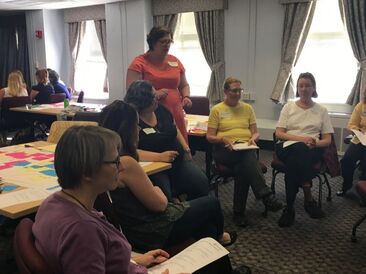 I design learning experiences for others as well. This year that included speaking engagements including workshops and sessions on a variety of topics:
I also created more in depth learning experiences for others. I led day-long workshops on building partnership and board development for a network of nonprofits as part of a longer series of trainings on strengthening organizational sustainability. One of the highlights of the past year was partnering with a colleague and 14 (relatively) new executive directors to facilitate a program designed to meet their specific needs. Through content and peer coaching, the group evolved over the course of eight months from a collection of individuals to a group who trusted each other with their most pressing challenges. It was so rewarding to support and help cultivate that shift. Nonprofit evaluative practice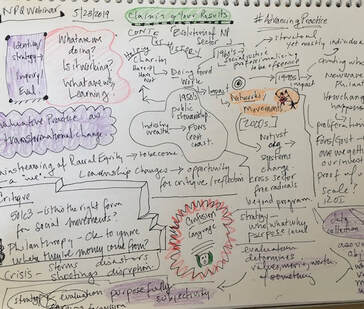 Claiming Your Results Claiming Your Results I participated in formal learning experiences offered by others. When I do, I practice my novice sketch-noting skills. A few highlights included: Nonprofit Quarterly’s webinar series on evaluative practice led by Jara Dean-Coffey and Jeanne Bell. The series stretched my conception of program evaluation and building learning organizations. My biggest take-away was the caution to be mindful of the purpose of any research. Part of this means making explicit the recognition that evaluation is always inherently subjective, even though it is often perceived as objective and the arbiter of worth and value. Being mindful of equity in evaluationToo many evaluation and other research efforts for programs that serve marginalized communities have been designed with the organization or researcher’s needs in mind, leaving the impact on the community out of the picture. The impact of this approach may be unintended or unintentional yet is extractive nonetheless. Learning and evaluation needs to be in service of the mission and mindful of impact, not just because one is curious. Learning with the brain in mind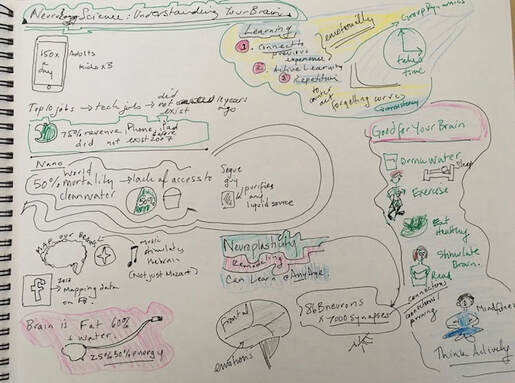 A session at American Society for Association Executive's (ASAE) Annual Conference in August focused on the basics of neuroscience and learning. Scientists now know that as adults we have neuroplasticity. So old dogs can learn new tricks! Designing learning with the brain in mind includes connecting the new information/content emotionally to the person’s previous experience, working with the material actively and repetition. It was good to hear that keeping my brain healthy includes all the habits we all have heard are healthy generally – staying hydrated, getting enough sleep, moving regularly, eating healthy, cultivating mindfulness and stimulating our brain on a regular basis. The last few years I have managed to make all of those regular practices, especially by reminding myself – something is better than nothing. Mission focused Collaboration Networks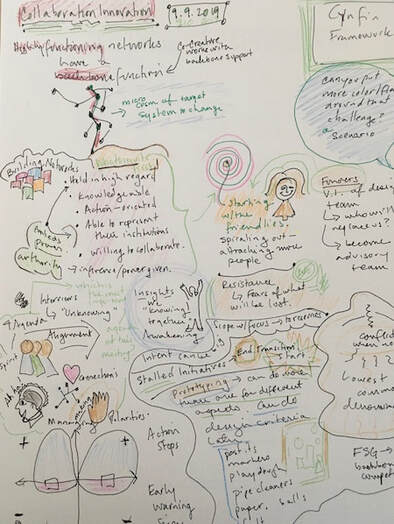 An exciting intensive training that I participated in focused on Collaborative Innovation. It centered on how to build collaborative networks intentionally to bring together organizations and groups of people. Networks have the potential to solve wicked problems beyond the capacity of one organization. Yet collaboration can be challenging and time intensive. By incorporating aspects of human centered design with iteration, rapid prototyping and testing, the network can move to action and not get bogged down in analysis paralysis. When started with intention they include both the power brokers in a system and those impacted by the system at the grassroots level, starting with the friendlies and then spiraling out. Harvesting in facilitation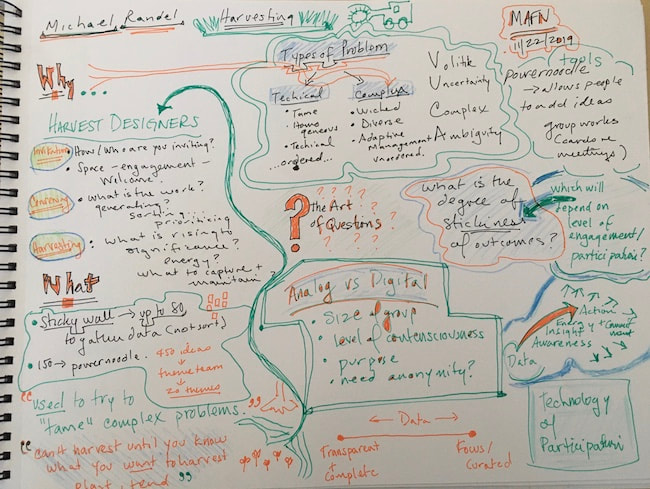 An important skill in facilitating is harvesting -- designing a meeting, a convening, a retreat with a set of intentions and outcomes in mind that will be harvested from the conversation. The degree of stickiness of the outcomes from a process is dependent on the level of engagement of those participating. When people talk about buy in, they need to remember that buy in is built not bought. Just telling people about a vision or a direction is not enough. Dewey contended that there is no real learning without reflection. “We do not learn from experience... we learn from reflecting on experience.” What are you reflecting on as the new year launches?
 Too many people – especially women – suffer from perfectionism. While it used to be that this was the perfect “weakness” to admit in a job interview, perfectionism gets in the way of performance rather than enhancing it. Perfectionists live in fear of mistakes. Gripped in this fear, they struggle with committing to a course of action, to get started, or to finish a project. Try and make mistakes I was talking to someone who was in the throws of perfectionism. I joked – why not try and make mistakes? Set that as your goal. Make as many mistakes as possible today. I was joking but why not give it a try. You can’t learn without making mistakes so rather than avoid them why not try to have them? This seems very counterintuitive yet if you were to approach your day that way I am guessing you would jump into action – because how else would you up your mistake ante? Also I would guess that you are unlikely to make a lot of mistakes, but making that goal might make them seem a little less scary. What’s the “right” place to start? Another person was trying to figure out the “right” way to start doing more strategic work with her board. There were lots of reasons that the board was in an operational mode. Crises in the past had forced it to shift its focus to the day-to-day. With the crisis past it had not yet shifted gears. There were lots of possible ways to get started. But she was paralyzed with looking for the “right” one – the strategic one. Certainly there is value in being strategic for greater impact and efficiency. But searching for the perfect strategic action can also have the impact of not taking any action. My feedback to her – pick one and start as an experiment. See how it goes. It might not be the “right” one and if not, adjust and try something new. Planning and experimenting I love planning and love working with organizations to help them think through their future direction to help them be more strategic. At the same time, organizations trip themselves up when they fall into the trap of thinking that they can plan out everything in detail at the outset. You just do not know what of your plans will be a ‘mistake’ or a learning opportunity. The ‘mistake’ provides you the opportunity to shift gears and try something new. Try thinking of your plan as a series of experiments. This way you can hold the plan more lightly and be more open to learning. Identify a couple big goals to set your own or your organization’s direction. Plan in more detail for the first year of implementation, especially first actions. Then get started.
Need help thinking about how to get started? Inquire about a complementary coaching session.  I allowed myself to take a break yesterday. I had been traveling for a chunk of the week and felt weary. My body and mind were telling me I needed a pause. Yet our go go culture abhors the break. When you are at your job and you are not being super productive instead of encouraging people to listen to your body and take a break, most work cultures want you to power through. Or at least pretend you are busy. Busy Bragging Rights Powering through was what I have done most of my life. I’ve played the “I’m more busy than you” game. I remember the one-up manship as early as when I was in college. ‘Oh geez got a paper due tomorrow and I haven’t started.” “Oh you think that is bad – I have a paper due and a test tomorrow.” And it continues – the endless cycle of bragging who is more overwhelmed by work. Multiple articles and studies have been done recently on the idea that busyness is a new status symbol. “I am a very busy and important person – you have two minutes to make your pitch.” I spent much of my teens and twenties sleep deprived. I’m not interested in winning this game any more. Recharging And today I just proved it doesn’t work anyway. After just 24 hours of a little rest and relaxation, I came back to my to do list fired up and moved through it with ease. I got more done today than I have in a while. And certainly more than if I had plodded through yesterday which would have spilled over into plodding through today. We are not machines A work ethic is critical. Yet lots of science is demonstrating that through our economy is made for machines – we have to remember we are actually NOT machines. In addition, much work today is now knowledge work that requires creativity and innovation. These require white space. They require all the things you were either told not to do growing up – day dreaming, for example. Or the things that weren’t necessarily valued - time away from work – play – time in nature. I don’t need to go to Arianna Huffington’s extreme of collapsing from exhaustion to agree with her assertion that our constantly busy ethic is killing us. Is rest just to make you more productive? At the same time, my argument is a little perverse – or at least still representative of our culture. My reason for a pause is to recharge to be able to get back to work and be more productive. I would call myself a recovering ‘productivity-a-holic.’ I can aspire to relaxing into taking a pause for the sake of taking a pause, rather than to just make me more productive later.
|
Categories
All
Archives
July 2024

Grace Social Sector Consulting, LLC, owns the copyright in and to all content in and transcripts of the Mission: Impact podcast, as well as the Mission: Impact blog with all rights reserved, including right of publicity.
|
Telephone301-857-9335
|
info[at]gracesocialsector.com
|
Grace Social Sector Consulting, LLC, owns the copyright in and to all content in, including transcripts and audio of the Mission: Impact podcast and all content on this website, with all rights reserved, including right of publicity.
|